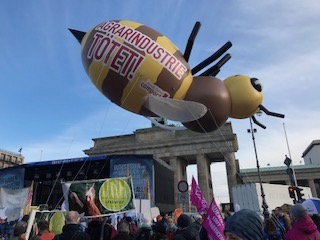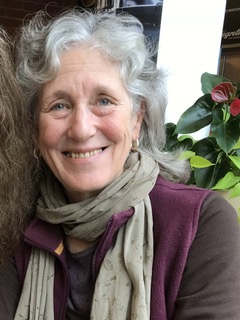
By Anna Gyorgy, for the Montague Reporter
BERLIN – On Saturday, January 18th, for the tenth year in a row, German farmers on tractors joined more than 25,000 colorful, banner waving supporters calling for a “U-turn” in farm and agricultural policy. Nature and animal protection groups, climate, food and justice activists, and many others rallied in central Berlin in weather warmer than in years past.
The name of the organizing alliance of 50-plus organizations, “Wir haben es Satt,” means “We’re Fed Up” or “We’ve Had Enough.” Enough of national and European Union policies, they say, that reward size over quality at a time of critical need for agricultural policies supporting a balanced climate and natural world. This outpouring happens in mid-January, when the world’s biggest international agricultural “Green Week” exposition takes place in Berlin. EU agriculture ministers also meet, and received activists’ demands.
The farmers who say they have “had enough” are not the industrial-scale ones receiving large European Union subsidies. Their smaller farms are rooted in their communities, and many farm organically. They are threatened by the cheap food of cost-cutting industrialized agriculture and increased chemical use.
The demonstrators also reached out to new allies this year, inviting the Fridays for the Future student climate strike movement, and working for dialogue with a new farmers’ movement that, although more limited and conservative in its initial program, has brought many farmers to the streets in recent months in support of regional agriculture.
First the Farms, Then the Villages
Over the last 30 years, three-quarters of Germany’s insect population have disappeared, and many small farms have, too.
The two losses are related. As in the US, biodiversity suffers when prices and subsidies reward plowing every inch of ground for crops, destroying hedges and wild areas crucial to insects, birds and small animals. But ecological farmers are not compensated for contributing to sustainabilty [sic].
“First the farms die, then the villages,” reads a sign on one demonstrator’s tractor. In the EU, the more land a producer has under cultivation, the greater the subsidy they receive. “We’ve Had Enough” demands a different agricultural policy: one supporting biodiversity and production of healthy food grown with fewer or no chemicals, less harmful fertilizers, and species-appropriate animal farming. It’s called the “Agrarwende,” or agricultural transition.
The coalition calls on the national government to finance this needed transition. “In the past 10 years, arable land ownership has concentrated in the hands of few but larger agro-industries, causing the closure of over 100,000 farms in Germany,” reads the coalition’s Call to Action. “Enough! Public subsidies should only be used to support farmers that protect the environment, climate and animal welfare.”
They are for fair global trade, global farmers’ rights, and rainforest protection, and against the proposed EU-Mercosur trade agreement (more on that below).
For years these groups have kept up strong and successful opposition to genetic engineering and the patenting of seeds. They also oppose the routine use of pesticides and artificial fertilizers, arguing that they contribute to the climate crisis and increase hunger.
The Next Decade
Several international speakers emphasized connections between agriculture and climate change. “We want to prevent the climate catastrophe,” said Polish activist Maria Staniszewska of the EU-wide Good Food Good Farming movement. “It affects the farmer first, then the consumer. We need a completely new agriculture… to save the planet. We must stop the death of small farms.”
“We are a movement of diversity against the industry that kills,” declared Indian writer and activist Vandana Shiva. She traced the agrochemical industry to IG Farben, which used chemicals to experiment on German concentration camp inmates.
As for the climate, Shiva said, “50 percent of greenhouse gases can be attributed to the agricultural industry and global trade in bad foods that are killing us.”
“The next decade will decide the future of humanity on this planet,” she continued. “The next great lie is having industrial food without farms. But we grow food with the living earth, and so we reverse species extinction and climate and environmental extinction… We must make every farm, every plate, and every body free of the poisons that kill us. Join the movement for a poison free planet by 2030! We give notice to the agro industry that billions of species and billions of people are stronger than a cartel of four agricultural chemical companies.”
From the Amazon to Europe
Genetically modified crops are not allowed in Germany, but as in most EU countries, they come through a “back door” – as GMO soy imported for animal feed from South America, especially Brazil.
This would expand under a recently-announced trade agreement between the EU and Mercosur states of Argentina, Brazil, Paraguay, and Uruguay. The demonstrators criticized the agreement, now pending ratification, for strengthening global corporations while harming indigenous people, local producers, the environment, and world climate.
“We have to reject the Mercosur Agreement,” warned Brazilian professor Antônio Andrioli. “We can’t make agreements with someone who steps on all rights and would bring more poison [agrochemicals] and cars to Brazil… We don’t need more soy in Germany: we need to produce what we eat. That is food sovereignty.”
For information in English on the EU-Mercosur Agreement:
https://www.guengl.eu/issues/explainers/eu-mercosur-free-trade-agreement-an-explainer/
